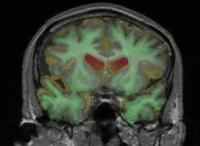 US scientists have found that complete or partial removal of an enzyme that regulates fatty acid levels improves cognitive deficits in a mouse model of Alzheimer’s disease, according to a new paper in Nature Neuroscience.The researchers from the Gladstone Institute of Neurological Disease have identified specific fatty acids that may contribute to Alzheimer’s disease as well as a novel therapeutic strategy.
US scientists have found that complete or partial removal of an enzyme that regulates fatty acid levels improves cognitive deficits in a mouse model of Alzheimer’s disease, according to a new paper in Nature Neuroscience.The researchers from the Gladstone Institute of Neurological Disease have identified specific fatty acids that may contribute to Alzheimer’s disease as well as a novel therapeutic strategy.
Fatty acids are rapidly taken up by the brain and incorporated into phospholipids, a class of fats that form the membrane or barrier that shields the content of cells from the external environment. The scientists used a large scale profiling approach (“lipidomics”) to compare many different fatty acids in the brains of normal mice with those in a mouse model of Alzheimer’s disease that develops memory deficits and many pathological alterations seen in the human condition.
Rebecca Wood, Chief Executive of the Alzheimer’s Research Trust, said:
“This research on mice suggests a connection between fatty acids and the abnormal brain activity that exists in Alzheimer’s disease. This is cause for cautious optimism, as fatty acid levels can be controlled to some extent by diet and drugs. However, it is not yet clear if these findings are applicable to humans, and a lot more research is needed before any human trials can be conducted. The Alzheimer’s Research Trust is funding several projects in this area.
“Unfortunately dementia research is severely under-funded in the UK, where Alzheimer’s and other dementias affect 700,000 people
Â
Source: Alzheimers Research Trust
